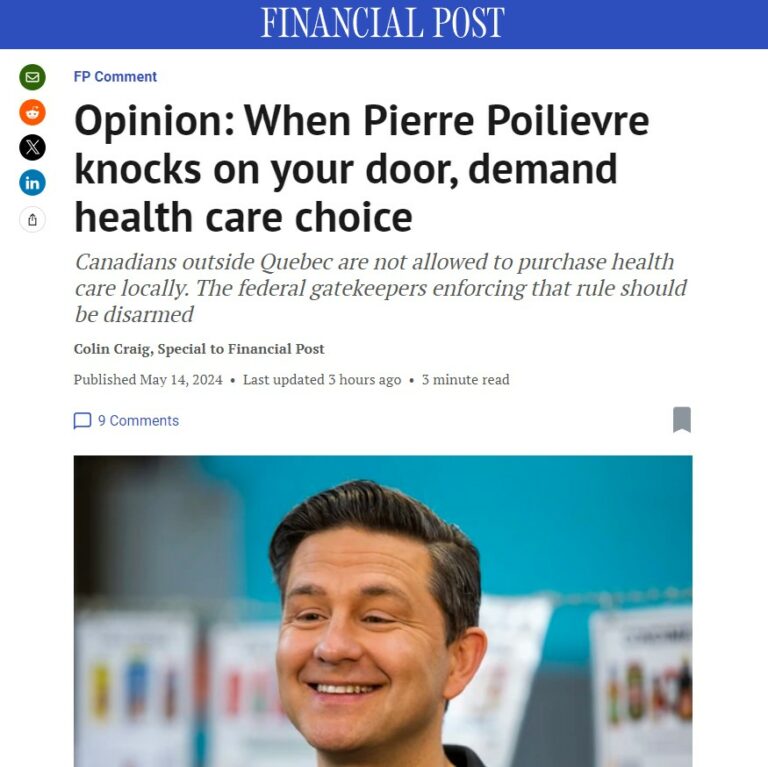Poilievre obviously isn’t the first politician to say he will listen to Canadians. Conservatives, Liberals and NDPers all claim the same — and always have. But how many have actually done anything about Canadians’ concerns? When it comes to health care, not many.
FINANCIAL POST COLUMN: When Pierre Poilievre knocks on your door, demand health care choice

Conservative Party leader Pierre Poilievre raised eyebrows recently with a column in this newspaper critiquing several business associations. Instead of funding lobbyists, he scolded business leaders, they should focus on convincing Canadians of the merits of changing government policies: “When (the public starts) telling me about your ideas on the doorstep in Windsor, St. John’s, Trois-Rivières, and Port Alberni, then I’ll think about enacting (them).”
From patients dying on waiting lists to “critically ill” patients being asked to share a single hospital bed, our system is in crisis. A recent Leger poll found that 64 per cent of Canadians believe it needs a “major change” while only five per cent felt more money was the solution. The public overwhelmingly understands that 30 years of throwing money at the system hasn’t worked.
So, who in Ottawa has been pushing for a “major change” in health care? No one. Mr. Poilievre therefore has a tremendous opportunity to demonstrate he wants to do things differently. He could take on federal health-care “gatekeepers.”
Ottawa regularly cuts health funding that goes to provincial programs that allow patients to choose between receiving scans or other services through the public system or paying for them at a non-government facility. Ottawa seems to believe everyone should suffer in solidarity in long queues in the government system.
Well, not exactly everyone. In an interview earlier this year, Dr. Brian Day, past president of the Canadian Medical Association, reminded us federal government employees are allowed to access private clinics for treatment, including at the Cambie Surgery Centre in Vancouver, which he founded. As he told the Vancouver Sun in 2017, “They are exempt from laws that force others to wait.”
Over the years, high-ranking Canadian politicians have often travelled to the United States for care, including former Prime Minister Jean Chrétien. Politicians with six-figure salaries and golden pensions have the means to escape the health care mess they and their predecessors have created.
But bans on paying for private health care can hit ordinary Canadians hard. Albertan Jeff Krushell told SecondStreet.org he had very dark thoughts as he coped with a one- to two-year wait for back surgery in the public system. Unable to endure the pain, he eventually looked at non-government options and, to his delight, discovered the only private clinic that offered the surgery he needed happened to be down the road in Calgary.
His excitement quickly faded, unfortunately, when he learned government rules prevented him from paying for treatment at the Calgary clinic. Everyone else in Canada could do that, just not Albertans. Jeff ended up traveling all the way to Atlanta for his operation. Nonsensical Canadian rules meant he had to spend more money on flights and accommodations and was robbed of having family by his side while he recovered from surgery.
Most Canadians — unlike virtually everyone else on the planet — face the same barrier to paying for private surgery in their own province. Quebec is the sole exception because of the Supreme Court’s 2005 Chaoulli decision.
Alberta Premier Danielle Smith recently suggested to us her hands were tied when it came to allowing Alberta patients to access private surgery in their own province. She intimated that the rule barring it is in place because if Alberta did allow patients to access local private surgery, Ottawa would reduce its health funding to her government.
Pierre Poilievre could address this problem by giving all Canadians the same rights Quebecers enjoy. He could amend the Canada Health Act to make it clear patients have the right to choose between using the public system, non-profits or private clinics. Sweden, Norway, Australia, New Zealand, the Netherlands, Germany, France and countless other countries that have better-performing universal health care systems than we do all give patients this choice.
A 2022 Leger poll found 62 per cent of Canadians support such a change. What’s the hold-up? Politicians in Ottawa who claim they’re listening but don’t take action.
For the sake of patients, let’s hope Mr. Poilievre is different. If he comes to your doorstep, be sure to tell him what you think about health reform.
Colin Craig is president of SecondStreet.org.
This column was originally published in The Financial Post on May 14, 2024.
You can help us continue to research and tell stories about this issue by making a donation or sharing this content with your friends. Be sure to sign up for our updates too!


